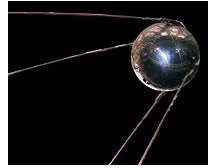This Day in Computer History: October 4
This Day in Computer History
1957
With the Soviet Union’s launch of Sputnik I, the Space Race begins. Russia’s success in launching the first artificial satellite caused a perceived technology gap between the world’s two superpowers that led President John F. Kennedy to publicly pledge that the United States would be the first nation to put a man on the Moon. The rapid technological development necessary to achieve that goal would become one of the driving forces behind the computer industry for decades to come.
1968
Science magazine ran an ad from Hewlett-Packard introducing the first programmable scientific desktop calculator to the world, “the new Hewlett-Packard 911A personal computer.”
1985
The Free Software Foundation was founded by Richard Stallman to support the GNU Project.
1997
Netscape Navigator 3.04 was released.
1999
Advanced Micro Devices released the 700 MHz AMD Athlon processor, the world’s fastest x86 processor. Price: $849 in 1,000-unit quantities
AmigaActive Magazine included HydraBBS 1.05 with the software included in its October issue. While its inclusion was an acknowledgment of the continuing popularity of BBS communities on the Internet, the fact that the software is six revisions behind the most recent release raises eyebrows throughout those BBS communities.
Intel Corporation announced that they have chosen “Itanium” as the brand name for its upcoming line of processors.
Red Hat released version 6.1 of its Red Hat operating system, “Cartman.” This version featured the Star Office 5.1a office suite.
2000
Maxtor announced the acquisition of hard drive manufacturer Quantum for about one billion dollars in stock.
2001
Microsoft unveiled the Pocket PC 2002 operating system, powered by Windows CE 3.0. Code-name: Merlin
2002
Twenty-seven year old Vasily Gorshkov of Chelyabinsk, Russia, received a three year prison sentence and seven hundred thousand dollars in fines for twenty counts of conspiracy, fraud, and computer crimes after hacking into PayPal and the Speakeasy ISP of Seattle.
2004
Version 2 of the R programming language was released. This version features “Lazy loading”, which is the ability to quickly load data with a minimal expenditure of memory.
2005
Dell announced the availability of a line of its Dimension E510n desktop computers shipped with a blank harddrive and a copy of FreeDOS. The system is designed for customers who want to install their own open source operating system. The E510n featured a Pentium 4 processor; 512 MB of DDR memory, a 128 MB ATI Radeon X300SE HyperMemory video card, and an 80 GB hard drive. Price: $849
Yahoo! acquires the online calendar service Upcoming.org.
2007
A jury determined Jammie Thomas to be liable for infringing on the copyright of twenty-four songs in the first music piracy case to ever make it to trial in the United States. The jury ordered the single mother of two to pay $9,250 for each violation, significantly more than the $750 minimum required by law. The case is highly controversial because the Recording Industry Association of America (RIAA), which brought the suit, was not required to prove that Thomas had at any point installed filesharing software on her computer or had, in fact, been using the computer at the time of the alleged infringement. The RIAA’s case was entirely predicated on the strength of the defendant’s Internet protocol (IP) address being associated with 1,702 songs on Kazaa. Because Judge Michael J. Davis gave the jury the instruction that making songs available constituted copyright infringement, he will be forced to declare a mistrial, bringing the issue to the center of Thomas’ re-trial.
This post is part of the series: A Chronology of Computer History for the Month of October: This Day in Computer History
This series provides a daily account of what happened on this day in the history of computing and technology. It discusses developments, breaking news, new releases and global implications that occurred as a result of these ground breaking events.
- This Day in Computer History: October 4
- This Day in Computer History: October 5
- This Day in Computer History: October 6
- This Day in Computer History: October 7
- This Day in Computer History: October 8
- This Day in Computer History: October 9
- This Day in Computer History: October 10
- This Day in Computer History: October 11
- This Day in Computer History: October 12
- This Day in Computer History: October 13
- This Day in Computer History: October 14
- This Day in Computer History: October 15
- This Day in Computer History: October 16
- This Day in Computer History: October 17
- This Day in Computer History: October 18
- This Day in Computer History: October 19
- This Day in Computer History: October 20
- This Day in Computer History: October 21
- This Day in Computer History: October 22
- This Day in Computer History: October 23
- This Day in Computer History: October 24
- This Day in Computer History: October 25
- This Day in Computer History: October 26
- This Day in Computer History: October 27
- This Day in Computer History: October 28
- This Day in Computer History: October 29
- This Day in Computer History: October 30
- This Day in Computer History: October 31
